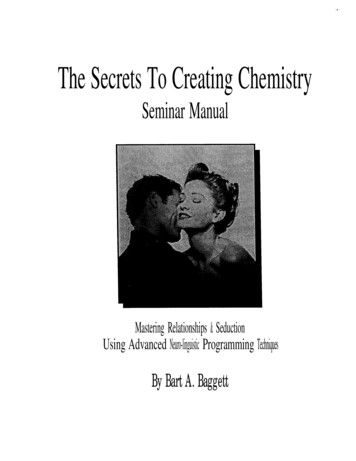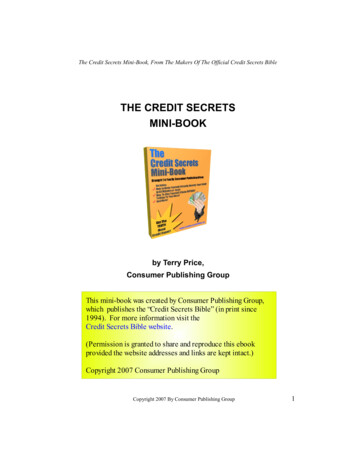
Transcription
s e c r e t sp e o p l ew i ntoa n dt e a m st h atc o n s i s t e n t ly MentorLeader.indd 1b u i l d i n g 11/18/2010 1:22:46 PM
MentorLeader.indd 211/18/2010 1:22:47 PM
t heM e n torL e ade rtonydungywithnathanwhitakertYndaLe hoUse pUBLishers, inC.CaroL streaM, iLLinoisMentorLeader.indd 311/18/2010 1:22:49 PM
Visit Tyndale’s exciting Web site at www.tyndale.com.TYNDALE and Tyndale’s quill logo are registered trademarks of Tyndale House Publishers, Inc.The Mentor Leader: Secrets to Building People and Teams That Win ConsistentlyCopyright 2010 by Tony Dungy. All rights reserved.Cover concept copyright by age fotostock/photolibrary. All rights reserved.Cover and author photos taken by Stephen Vosloo, copyright by Tyndale House Publishers, Inc.All rights reserved.Designed by Dean H. RenningerEdited by Dave LindstedtPublished in association with the literary agency of Legacy, LLC, Winter Park, Florida 32789.Unless otherwise indicated, all Scripture quotations are taken from the Holy Bible, New LivingTranslation, copyright 1996, 2004, 2007 by Tyndale House Foundation. Used by permissionof Tyndale House Publishers, Inc., Carol Stream, Illinois 60188. All rights reserved.Scripture quotations marked ESV are taken from The Holy Bible, English Standard Version, copyright 2001 by Crossway Bibles, a publishing ministry of Good News Publishers. Used bypermission. All rights reserved.Library of Congress Cataloging-in-Publication DataDungy, Tony.The mentor leader : secrets to building people and teams that win consistently / Tony Dungywith Nathan Whitaker.p. cm.ISBN 978-1-4143-3804-0 (hc)1. Leadership—Religious aspects—Christianity. 2. Mentoring—Religious aspects—Christianity.3. Leadership. 4. Mentoring. I. Whitaker, Nathan. II. Title.BV4597.53.L43D86 2010158′.4—dc222010020832Printed in the United States of America16 15 14 13 12 11 107 6 5 4 3 2 1MentorLeader.indd 411/18/2010 1:22:49 PM
ContentsForeword by Jim CaldwellAcknowledgmentsIntroductionviixixiiiThe Mandate of a Mentor Leader:Focus on Significance 12 : The Mind-Set of a Mentor Leader:“It’s Not about Me” 193 : The Maturity of a Mentor Leader:A Look Within 454 : The Marks of a Mentor Leader:Characteristics That Matter 675 : The Moments of a Mentor Leader:Influence and Impact 996 : The Model of a Mentor Leader:Living the Message 1237 : The Means of a Mentor Leader:Maximizing Team Performance 1398 : The Methods of a Mentor Leader:The Seven E’s of Enhancing Potential 1659 : The Measure of a Mentor Leader:Building Other Lives of Impact 193Chapter rChapterQ & A with Tony DungyAbout the AuthorsMentorLeader.indd 520522911/18/2010 1:22:49 PM
MentorLeader.indd 611/18/2010 1:22:49 PM
forewordby Jim CaldwellOn Friday, November 17, 2006, two days before a big game againstthe Dallas Cowboys, head coach Tony Dungy received word throughour security officers that a party was going to take place and thatmany of our players would be in attendance. As you can imagine,once this party was publicized, it would draw a crowd of great Coltsfans who wanted to be in the midst of the action, but also others whomay have had different motives.The Indianapolis Colts have not had many players who have runafoul of the law—and there are distinct reasons why. Number one,under the leadership of owner Jim Irsay, president Bill Polian, andTony, the team had a policy of placing character in the forefront ofthe player-selection process. It was a common organizational practiceto eliminate players—even talented “difference-makers”—from consideration in the draft if they possessed questionable character flaws.Number two, the team is committed to purposeful, effective communication. Tony began most team meetings by reminding everyoneto refrain from questionable behavior. To emphasize his point, heviiMentorLeader.indd 711/18/2010 1:22:49 PM
The M en tor Le a de rused an overhead projector to display newspaper clippings involvingother professional athletes who had been arrested or accused of illegalactivity. He highlighted the circumstances surrounding the incidentsand discussed ways to avoid a similar fate.During our customary 9 a.m. team meeting that Friday, Tonywarned the team about the party scheduled for that evening. He drovethe point home clearly and succinctly: “We do not need any distractions.” We were undefeated, 9–0 to be exact, and we were traveling toDallas the next day. As the saying goes, forewarned is forearmed, butnot all our guys got the message.At the party, an altercation occurred and one of our team members put himself in a position to be detained by the police. Thoughsome of the details are still rather sketchy and remain unanswered, itinvolved a contentious exchange with a woman at the party.As you can imagine, the incident did not sit well with Tony. Theviolation appeared to fly in the face of his warning, and he was notamused. Tony rarely displays a visible reaction to uncomfortable situations, but if you had been around him as long as I have, you wouldhave sensed his displeasure.On Saturday morning, before our flight to Dallas, Tony met withthe young man, and he later made the team aware of the incident. Hesaid he didn’t know exactly how he was going to respond, but therewould be consequences. He later handled the situation privately withthe individual involved.After the 2005 season, I had a few NFL teams contact me abouttheir head coaching positions. Those inquiries didn’t result in a joboffer, but in order to prepare myself for future opportunities and thepossibility of one day leading an NFL franchise, I asked Tony if hewould mind if I came into his office periodically to ask him a question or two about the role of head coach. He was always so gracious,and he agreed enthusiastically to my request.The Thursday after the Dallas game, when I went in to ask TonyviiiMentorLeader.indd 811/18/2010 1:22:49 PM
FOREWORDa few questions about managing the team, I also asked him whetherhe was inclined to demonstrate a show of force in response to theincident from the previous week. His simple five-word reply—“It isnot about me”—resonated with my spirit, and it is one of the mostprofound lessons I learned from him.A typical leader might have tried to maintain his posture ofauthority in front of the team by “saber-rattling” and creating a sceneas a deterrent—pounding on the podium and making an example ofthe player, in response to the infraction. But Tony took an alternateapproach. As long as the player got the message and learned from hismistake, Tony was more interested in what was most important forthe team and the franchise.By the way, he never had another issue with that young man. Thetwo of them share a unique bond today, and they continue to stayin touch.In his book Good to Great, Jim Collins identifies the characteristics of highly effective companies and companies that fail. Whileconducting his research, he found that chief executive officers of theeffective companies had similar traits—which Collins calls Level 5leadership traits. The description of the Level 5 leader sums up Tony’sleadership DNA perfectly:Level 5 leaders . . .embody a paradoxical mix of personal humility andprofessional will.display a compelling modesty, are self-effacing and understated.attribute success to factors other than themselves.display a workmanlike diligence—more plow horse thanshow horse.attribute success to factors other than themselves.set up their successors for even greater success.*I will say “amen” to that. Tony graciously empowered me and others*Jim Collins, Good to Great (New York: HarperBusiness, 2001), 39.ixMentorLeader.indd 911/18/2010 1:22:49 PM
The M en tor Le a de rto reach our full potential and take ownership of the team’s success.He was an active participant in our development, and he checkedhis ego at the door. He was more likely to ask questions than makedecrees.Subsequent to Tony’s retirement, I have often been asked, “Howwill you fill those big shoes?” My response has been, “I don’t have todo it alone.” There is only one Tony Dungy, Joe Paterno, or ChuckNoll. The leadership style that Tony employed allowed for a sense ofautonomy, development, growth, understanding, and ownership.Furthermore, with the Colts, we have an excellent owner whoknows the business inside and out. We have an elite personnel department that is experienced and knowledgeable and always two stepsahead of the curve. We have a great coaching staff of outstandingteachers. We have a group of players who listen to every word we say,and they believe in our formula for winning. We have veteran leadership that has taken ownership of the team, setting a businesslike tonewith unparalleled work habits.Because of Tony’s leadership style, he allowed those around himto function in an atmosphere where autonomy was the rule and notthe exception. He nurtured and cultivated both players and coaches,molding without pressing, nudging without pushing, and leadingwithout dragging.Having worked with Tony and learned from him made my joba lot easier in the first year after his retirement. All I had to do wastweak a few things to match my own personality and then managefrom the middle, as I had seen Tony do, and not be fearful of empowering those around me. Observing Tony during the eight years weworked together was truly a blessing. Now you have an opportunityto see why success was so prevalent under his reign, and to witnessthe impact his leadership style had on everyone around him. I daresay that, after you’ve read this book, you will be impacted profoundlyas well.xMentorLeader.indd 1011/18/2010 1:22:49 PM
AcknowledgmentsOnce again, Tony and I recognize that we could not have done it alone.And once again, Tony is reluctant to single out individuals because of hisconcern—borne out by the feedback we’ve received from our prior books’acknowledgments—that we will overlook someone. However, I will tryonce again, fueled by the knowledge that, though Tony could have pulledthis off by himself, once I was involved—as those who know me well willrecognize—there must have been a village behind our efforts to save it andmake it a decent read.Our gratitude extends beyond the names listed below, to those whohave supported our endeavor in so many ways. Those who went beyondthe call of duty include:Donald Miller, who graciously gave of his time to share his passion formentoring.John Streitmatter, of Leadership Research Institute, and Heath Schiesserfor generously reviewing the manuscript to keep us from misrepresentingthe latest in leadership research. If we have persisted in making errors, it isdespite their best efforts.xiMentorLeader.indd 1111/18/2010 1:22:49 PM
The M en tor Le a de rD. J. Snell, our literary agent and partner in our literary undertakings, from the inception of the idea to the completion of the work andbeyond.Our steadfast partners at Tyndale House, including but not limitedto Doug Knox and Jan Long Harris, who convinced Tony that this was atopic he needed to tackle; Dave Lindstedt, Sarah Atkinson, Bonne Steffen,Jonathan Schindler, Yolanda Sidney, Nancy Clausen, and Todd Starowitz.Jessica Quinn, who has been such a loyal partner in each of ourprojects.Scott Whitaker, whose leadership insights helped me develop initialconcepts, and whose wordsmithery—both in the drafting and editingstages—helped bring this book into being.And, once again, to our wives, Lauren and Amy, and our children,Tiara, Eric, Hannah, Jordan, Jade, Ellie Kate, Justin, and Jason, for yourpatience and for filling our homes with such joyful, delightful distractionsas we worked.xiiMentorLeader.indd 1211/18/2010 1:22:49 PM
IntroductionIf all you’re about is winning, it’s not really worth it.I’m after things that last.Keli McGregorIt was still raining steadily, but my thoughts were far away fromthe weather. While still captured by the euphoria of the moment,I turned philosophical, thinking, “How did I get here?” Of all thepeople who could have been headed up the steps to the podium toaccept the Lombardi trophy for winning Super Bowl XLI, it was me.As soon as I thought it, though, I knew it wasn’t only me. Instead,it was a combination of my mom and dad, Lauren, Allen Truman,Dave Driscoll, Leroy Rockquemore, Cal Stoll, Donnie Shell, JohnStallworth, Chuck Noll, Richard Farmer, Denny Green, Rich McKay,Bill Polian, and so many others who had, for whatever reason, builtinto my life.xiiiMentorLeader.indd 1311/18/2010 1:22:50 PM
The M en tor Le a de rI had been mentored by so many. They had all added value tomy life. And my leadership style had been influenced by them. I hadthought about the idea of leading in such a way that it created valuefor others, but in that moment, thinking of so many people who hadmade a difference in my life and had so much to do with my beingon that podium in that steady drizzle, the idea of mentoring crystallized for me. It isn’t a structured program that necessarily makes thedifference; rather, the difference is made moment by moment byleaders who care—for others.As I hoisted that trophy above my head, I realized the responsibility we all have to become mentor leaders in the lives of others.Most people, at one time or another in their lives, will take on therole of a leader—whether formally or informally, at work, at home,or at church. And most people, if they’re honest about it, would saythey feel a little inadequate in that role—whether as a parent or aboss or a team leader. Actually, some self-doubt is a healthy attributein a leader.Leadership is necessary in any human society; thus, a leadershipvoid will not exist for very long before someone steps up to lead,either by popular acclaim, selection, or self-appointment. The question is, what type of leader will that person be?This question is more than academic, however, for the leadershipstyle can dictate how effective that person will be, and how significant an impact the person’s leadership will create.In my life and career, I have seen all kinds of leaders, but theones who have had the greatest positive impact on my life are theselect few who have been not only leaders but also mentors. In fact,it is largely because of the influence of mentors in my life that I wasdrawn to write this book.I believe that certain principles of successful leadership are timeless.In other words, they’re not just the latest fad or fashion, and they’renot dependent on or dictated by our circumstances. Furthermore,x ivMentorLeader.indd 1411/18/2010 1:22:50 PM
In t r oductionI have come to realize that these principles can be taught, learned,absorbed, and then passed on to others, especially to those whom weourselves have the privilege to lead.Conventional wisdom says that leaders are born, but I don’t believethat’s true. From what I’ve seen, positive, life-changing leadership isan acquired trait, learned from interaction with others who knowhow to lead and lead well. Leadership is not an innate, mystical gift;rather, it is a learned ability to influence the attitudes and behaviorof others. As such, we can all learn—and then teach others—how tounderstand and apply the principles of successful leadership.I spoke with the head of a Fortune 300 company who noted thathe had recently experienced an awakening in how he interacted withhis employees. He said, “I had long known that I could influencewhether or not my employees had a good day; it was fairly obviousthat I held sway over that, for better or worse. But one day, as I drovehome, trying to fight off a dark cloud from a tough day’s work andtrying not to let it affect my family when I walked through the frontdoor, I realized that many, if not all, of my direct reports were experiencing the same thing. If they weren’t able to compartmentalize theirfrustration, anger, and irritation, then they were going to take thosetoxic feelings into their homes. I don’t simply have an impact on mydirect reports—there is an exponential effect on those around themas well, based in no small part on their interactions with me.”Understanding the profound effect of our leadership is often thefirst step toward adopting a style of leadership that has proved itselfeffective over many generations—a style I’m calling mentor leadership. It isn’t so much the creation of a new kind of leadership as it isa recognition and exploration of a model I’ve learned—and tried topractice—throughout my life.Much of what I’ve learned I owe to two men in particular: myfather, Wilbur Dungy, who provided a consistent model for methrough his teaching, coaching, and parenting; and Chuck Noll,xvMentorLeader.indd 1511/18/2010 1:22:50 PM
The M en tor Le a de rmy head coach when I was a player and an assistant coach with thePittsburgh Steelers.They, in turn, were shaped by others—my father by my grandfather, Herbert Dungy, who modeled for my dad what he in turnmodeled for my siblings and me; and Coach Noll by Paul Brown andDon Shula, coaches under whom he coached and played.As their title suggests, mentor leaders seek to have a direct, intentional, and positive impact on those they lead. At its core, mentoringis about building character into the lives of others, modeling andteaching attitudes and behaviors, and creating a constructive legacyto be passed along to future generations of leaders. I don’t think it’spossible to be an accidental mentor.While leading in such an intentional manner, mentor leaders cannot help but also have a positive impact on others—whether as rolemodels or through the lives of the people they have mentored. Theprimary focus of mentor leadership, however, is to shape the lives ofthe people right in front of them, as they lead, guide, inspire, andencourage those people.We often mirror what we see. Coaches will model the behavior ofsuccessful coaches they know or observe, sometimes with detrimentalresults. Similarly, business leaders model other business leaders—orwhen necessary, try to do the opposite, whatever that might be.Too often, though, we choose people to mirror or model, andleadership books to read, solely for the purpose of figuring out howto win more games or increase our financial bottom line. In the process of looking for leadership models to emulate, we choose peoplewho have won a lot of games or who have made a lot of moneyfor themselves or their organizations, with little thought given tohow they have affected the lives of the people around them. If alongthe way lives are made better, we too often view it as a wonderfulby-product rather than as a primary purpose of leadership.I don’t have all the answers, but my hope is that you’ll find enoughx viMentorLeader.indd 1611/18/2010 1:22:50 PM
In t r oductionhere that will help you become a positive mentor leader in whateversetting you find yourself.Before we get into the heart of our discussion, here are someessential traits of a mentor leader to keep in mind: Becoming a mentor leader is not rocket science. If it were,I wouldn’t be writing a book about leadership. As we’ll see,leadership consists of principles and skills that are accessibleto anyone and everyone. They aren’t necessarily intuitive, butthey aren’t terribly difficult, either.Mentor leadership can be taught and learned; but in order tobe absorbed, it must be practiced. The best way to evaluateleadership philosophies and find your own style is by testingthem in action. You can’t stay in the ivory tower readingbooks and discussing theories. Eventually you have to wadeinto the fray.Mentor leadership focuses on developing the strengthsof individuals. It might be in a fairly narrow way, such asbuilding a specific skill, or more broadly focused, such asteaching employees to be proactive about meeting others’needs so they can better support the organization. Successfulmentor leaders make the people they lead better players,workers, students, or family members—and ultimately,better people.Mentor leadership works best when the ones being mentoredare aware that the mentor leader has a genuine concern fortheir development and success. Those we lead will be morereceptive if they believe we genuinely want them to succeed.Though true mentor leadership is intentional, we need to understand that people are watching us and learning from us whether we’reaware of it or not. The leadership we model can lead to positive orx viiMentorLeader.indd 1711/18/2010 1:22:50 PM
The M en tor Le a de rnegative results. We’ve all seen cases where leaders have unintentionally fostered destructive, dysfunctional, or damaging behaviors.Parents who have heard their children echo harsh words to a pet, doll,or sibling will know what I mean.Success for a mentor leader is measured by different standardsthan those commonly accepted in our society. Mentor leadershipis all about shaping, nurturing, empowering, and growing. It’s allabout relationships, integrity, and perpetual learning. Success ismeasured in changed lives, strong character, and eternal valuesrather than in material gain, temporal achievement, or status.Ultimately, mentor leadership is just as successful in achieving thestandards of accomplishment in our society. But unlike other typesof leadership, it is primarily concerned with building and addingvalue to the lives of people in the process.It’s about changing lives.A Mentor Leader.xviiiMentorLeader.indd 1811/18/2010 1:22:50 PM
Chapter 1The Mandate ofa Mentor Leader:Focus onSignificanceYou’ve got to do your own growing, no matter how tall yourgrandfather was.Old Irish proverbOn January 24, 2010, as I sat in the stands at Lucas Oil Stadium,watching the Indianapolis Colts celebrate their victory over the NewYork Jets in the AFC Championship Game, I couldn’t help but reflecton my relationships with the five men who now stood on the podiumat midfield, handing the championship trophy from one man to thenext—owner Jim Irsay, general manager Bill Polian, head coach JimCaldwell, and team captains Peyton Manning and Gary Brackett.I felt a measure of satisfaction that day, knowing that each ofthese leaders—along with the rest of the team—had committed to acommon vision and a common goal at the beginning of the season.The goal, of course, was to win a championship, but along withthat, everyone was concerned with raising the performance of all1MentorLeader.indd 111/18/2010 1:22:50 PM
The M en tor Le a de rthe others, with helping them become better players, better coaches,and better men. Each man had a different role and responsibility inaccomplishing that goal, but they had all been united in purpose andin their pursuit of excellence. And now they were able to celebratetheir success together.Not only were these men leaders in a positional sense within theorganization—and thus were enjoying the team’s success—but theyhad also embraced the principles of mentor leadership and wereleaders in a relational sense as well. If they hadn’t established thetypes of relationships they had with each other and with the othercoaches and team members, but had only counted wins and losses,they would not have had the same level of positive influence on eachother, and the season would not have been as successful. But I knewthese men were good, grounded people, whose desire in everythingthey did was to make each other better—which, in my view, is a moreaccurate measure of success than wins and losses. It is also a definingcharacteristic of a mentor leader.Unity of purpose and a desire to make other people better muststart at the top if these goals are going to ripple through an entireorganization. But, unfortunately, the opposite is equally true. I thinkwe’ve all seen examples of the head coach Unity of purposewho sits down at the table in the mediaand a desire to makeroom after the game, still basking in theother people betterafterglow of the big win. Behind him isthe backdrop with the team logo and themust start at thecorporate sponsor of the day, and as thetop if these goalscoach answers the reporters’ questions, heare going to rippleuses words such as we, us, and our, butthrough an entirewhat he really means is I, me, and my. Andorganization.everyone on his team knows it—from theassistant coaches, who are often pushed aside or belittled in practice;to the players, who incur the coach’s wrath if they do not perform2MentorLeader.indd 211/18/2010 1:22:50 PM
The M an dat e of a Me ntor Le a de rexactly as expected; to the members of the support staff, who aretreated as less than human; to the families, who are not allowedanywhere near the workplace for fear they’ll cause a loss of focus—orworse, that their presence might reorient the team’s priorities awayfrom winning games. After a while, people see through the talk whenit doesn’t line up with the walk.When a team wins or a business is successful, the families of theplayers or the workers may be excited for the moment; but when theycount the cost, I wonder how many would say that the temporaryaccomplishment outweighs all the memories missed or the bondsnot formed. Or, worse yet, maybe they have been programmed overtime to believe that the all-encompassing sacrifice of family, community, time—or anything other than what it takes to win games, closesales, or build a business—is an accepted part of life, simply what isrequired to achieve the number one priority: winning.Sadly, such “accomplishment” without significance will ultimatelyprove to be meaningless and without lasting value. Mentor leadersinsist on more and define success in a much more robust and wellrounded way.Mentor Leaders Put People FirstDon’t copy the behavior and customs of this world, but let Godtransform you into a new person by changing the way you think.Then you will learn to know God’s will for you, which is goodand pleasing and perfect.Romans 12:2Shortsighted leadership focuses primarily on the bottom line. In football, it’s wins and losses and playoff berths. In business, it’s quarterlyprofits, shareholder equity, and sales targets. Not that these thingsaren’t important—they are. But when they become the primary focusof a business or a team, they inevitably result in an organization3MentorLeader.indd 311/18/2010 1:22:50 PM
The M en tor Le a de rthat is out of balance. Leaders whose definition of success dependson such a short-term focus—and by short-term I mean temporal, noneternal—will one day wake up to discover they’ve missed out onwhat is truly important in life, namely, meaningful relationships.When life in the workplace is all about results and outcomes, it’seasy to adopt the same mind-set in other venues as well. Thus, wehave parents who scream at the umpire at Little League games, orbrowbeat their kids into getting straight A’s, or harp on the playersthey coach in Pee Wee football about being “mentally tough.” Athome, in the limited time left for family, Shortsightedthey’re tempted to criticize if the houseleadership focusesisn’t just so or to cram in everything theywant their spouses or kids to know, insteadprimarily on theof taking time to build the kind of familybottom line.relationships that God intends.In our society, whether we’ll admit it or not, the prevailing attitude is that the ends justify the means. We tell ourselves that “qualitytime” can make up for a lack of quantity time and that as long as weachieve whatever temporary, worldly goal we’re pursuing, all is well.Just keep climbing. We think our spouses and kids need us first tobe successful, and then we’ll have time to be an important part oftheir lives.We rationalize this kind of fuzzy thinking until we really beginto believe that our example, our impact, and our value to others—family, friends, and coworkers—are measured by what we produceand by the worldly things we accumulate. Our society loves andrespects awards, degrees, money, status, achievement, and image. Justlook at the accolades we heap upon business tycoons, movie stars,professional athletes . . . and football coaches.But without meaningful relationships, relationships we investourselves in, what does it all amount to?That’s an easy one to answer: dust.4MentorLeader.indd 411/18/2010 1:22:50 PM
The M an dat e of a Me ntor Le a de rIf you take only one thing from this book, let it be this: Relationshipsare ultimately what matter—our relationships with God and withother people. The key to becoming a mentor leader is learning howto put other people first. You see, the question that burns in the heartof the mentor leader is simply this: What can I do to make other peoplebetter, to make them all that God created them to be?A life spent focused on things of the world will not add value tothe lives of others.Instead of asking, how can I lead my company, my team, or myfamily to a higher level of success? we should be asking ourselves,how do others around me flourish as a result of my leadership? Dothey flourish at all? How does my leadership, my involvement intheir lives—in whatever setting we’re in—have a positive and lastinginfluence and impact on them?If influence, involvement, improvement, and impact are coreprinciples of mentor leadership, how can we make them central toeverything we do? That’s the question I intend to answer in the pagesto follow.Simply stated, leadership is influence. By Relationshipsare ultimatelyinfluencing another person, we lead that person. Leadership is not dependent on a formalwhat matter—position or role. We can find opportunities forour relationshipsleadership wherever we go. Likewise, leader with God and withship is not based on manipulation or prescripother people.tion, though sometimes it may appear that wayto an outside observer. By keeping our motives aligned with doing thebest for those around us, we will keep ourselves focused on being apositive influence.I recognize that the world is not necessarily lacking in leadership books. There is certainly no shortage in the bookstores—andeveryone from professors with PhDs to “successful” business executives to politicians
*Jim Collins, Good to Great (New York: HarperBusiness, 2001), 39. MentorLeader.indd 9 11/18/2010 1:22:49 PM. the Mentor Leader x to reach our full potential and take ownership of the team’s success. He was an active participant in our development, and he checked his ego a











